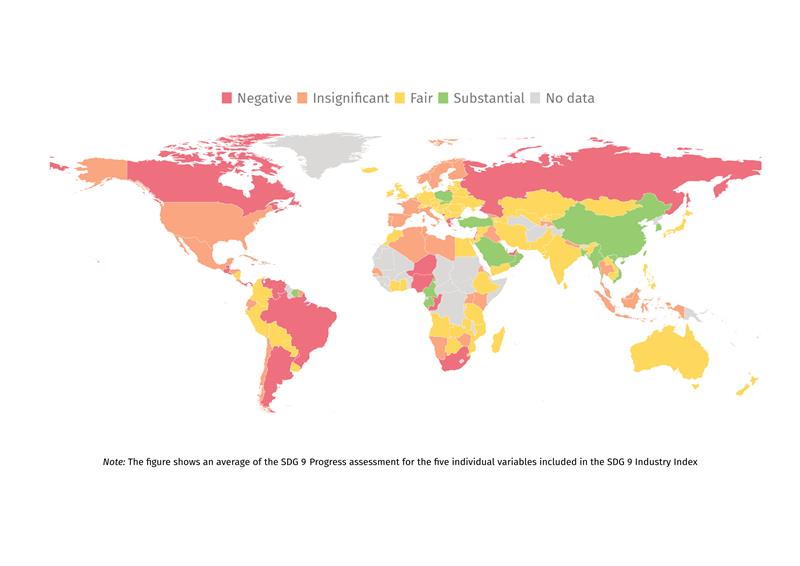UNIDO report sheds light on progress with Sustainable Development Goal 9
14 September 2023

VIENNA - As the world reaches the midway point towards 2030, the pursuit of the industry-related targets of Sustainable Development Goal 9 stands at a crucial juncture. The 2023 edition of UNIDO’s SDG 9 Progress Report provides an in-depth analysis of global and regional industrial development trends, and shows that, despite a few pockets of progress, many countries have made only limited headway in achieving the Goal’s targets, with some even regressing.
One notable observation is that all country groups have seen an upward trend in the overall SDG9 Industry Index. Both high- and middle-income industrial countries have achieved the best performance, while low-income economies, despite increasing their score by 9% since 2015, remain at a considerable distance from other regions at the bottom of the ranking.
Middle-income economies, on the other hand, only saw limited improvements, which should be a cause for concern considering that industrial development remains pivotal for sustained growth and escaping the middle-income trap. Preventing premature deindustrialization should thus be a top policy priority for the countries in this group.
A detailed breakdown of progress across the different SDG9 dimensions by country group shows that important strides have been made towards reducing CO2 intensity in manufacturing. High-income economies take the lead due to their focus on higher-technology sectors, which generally result in lower CO2 emissions. Low-income economies follow closely behind, as a substantial share of their manufacturing activities is concentrated in lower-technology activities, which also tend to be low carbon-intensive. High- and middle-income industrializing economies, which often specialize in resource-based manufacturing activities, have made the least progress in this dimension.
Despite these positive trends, the fact that progress across all indicators has generally been insufficient in the context of the 2030 target values and that the share of manufacturing in both GDP and in employment has regressed across all country groups compared to the 2015 baseline, is alarming.
The global outlook assessment sends a clear message: unless there is resolute acceleration of progress over the next few years, the world will fall short of reaching SDG9’s industry-related targets by 2030. Only a small share of economies are currently identified as being “on track”, while the majority must either pick up pace or reverse current trends.
With the renewed focus on accelerating the green transition, strategic sector prioritization, addressing inequalities in the digital and innovation sectors, and reflecting on lessons from the COVID-19 pandemic, industrial policies are back on policymakers’ agendas. This shift in focus has generated a growing demand for comprehensive industrial data to guide targeted policies and monitor their outcomes.
In line with Secretary-General Guterres’ “Quintet of Change”, which calls, among others, for a data-driven transformation to empower decision-makers with stronger insights and policy advice, to facilitate greater data access and sharing, increase transparency and accountability, and to ultimately provide better services for people and the planet, UNIDO’s SDG 9 Progress Report clearly shows that countries that lack sufficient data are often those that stand to gain the most from sustained progress in structural transformation. Low-income economies and countries facing specific development challenges could substantially benefit from industrial advancements as a strategy to stimulate economic growth and improve living standards. However, this hinges on the implementation of evidence-based targeted policies and the monitoring of their outcomes.
As the world strives to build more sustainable, innovative, and inclusive industrial systems, concerted global efforts are urgently needed to ensure that no one is left behind on the path to a more prosperous and sustainable future.
The full report is available here.
For further information, please contact:
Fernando Cantu, Chief Statistician